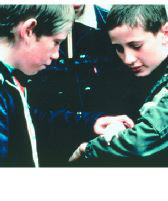ANDREW WYETH couldn’t have painted a better scene than when skinny 12-year-old James Gillespie runs through golden fields, his slight figure bobbing through tall grass. The idyllic moment comes as a respite in Ratcatcher, first-time director Lynne Ramsay’s festival hit about kids living in a crumbling low-income neighborhood in early 1970s Glasgow.
RATCATCHER
written and directed by Lynne Ramsay with William Eadie, Tommy Flanagan, and Mandy Matthews runs February 9-15 at Varsity
Half the units in the Gillespie family’s apartment building are condemned, but things go from bad to worse when the garbagemen strike, leaving piles of refuse to collect in hallways, sidewalks, and lawns. Children while away their afternoons sorting through trash, chasing rats, and sitting on plastic bags that bulge like beanbag chairs. It’s only a matter of time before a television news crew comes to report on the numerous health hazards and “the good people of Glasgow living under horrible conditions.” Like a more focused Harmony Korine, Ramsay builds this grim tableau around a child, James (William Eadie), the pensive lad whose youth seems to have drowned along with his friend Ryan.
Perhaps it’s his growing sense of guilt over Ryan’s death or all the gray misery around him, but James appears sapped of spirit, his reactions often slow and clumsy. He does nothing to help a lanky plain Jane (Leanne Mullen) as she’s taunted and sexually coerced by a gang of boys. Later, however, he and the 14-year-old girl share an intimate moment as they simply wash each other’s lice-infested hair. Similar to war-weary veterans, their relationship is less about adolescent lust than commiseration.
As a coming-of-age narrative, Ratcatcher is at the opposite end of the spectrum from, say, Giuseppe Tornatore’s Mal计, the recent Italian art-house release filled with cute, well-fed boys. Bereft of silly feel-good youthful antics, Ratcatcher gives a rare portrait of children as hardened survivors—while also avoiding the mawkish territory of Angela’s Ashes. Meanwhile, cinematographer Alwin Kuchler provides balanced, realistic images of the gritty neighborhood. He doesn’t overstylize its decay nor overidealize the sunny cornfields in which James escapes his foul city.
The film is admirably executed in a humble sort of way, with solid performances from its neophyte actors. One remarkable novice is John Miller, who plays Kenny, an urchin with a speech impediment in desperate need of Ritalin. Keeping a mouse in his pocket, he mutters about having the world’s biggest zoo someday. If he sounds like a typical homeless person on the bus—with multiple cuts and bruises that hint at child abuse—Kenny also provides the few boyish follies that are otherwise absent in this picture. Even in such squalor, kids will still be kids.







